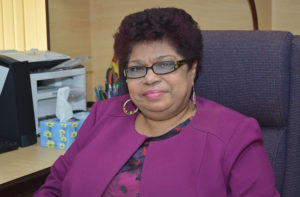
Trafficking in Persons (TIP) remains an issue for Guyana. Due to Guyana’s porous borders, high numbers of foreigners are trafficked into the country. According to Social Protection Minister Amna Ally, some 16 foreign nationals were rescued from being trafficked during the month of May alone.
Ally made the disclosure during the launch of Freedom Fest in commemoration of World Trafficking in Persons Day at D’Urban Park. She said 14 Venezuelans, one Cuban and one Dominican Republic national were rescued during a raid executed by the Guyana Police Force in May of this year.
Additionally, she explained that from January 5 to July 03, 2018, some 77 TIP victims were rescued from being trafficked, and were provided with the necessary psychosocial support.
According to Minister Ally, 60 of the 77 victims were placed in protective care, while some were assisted with job placements, educational and training opportunities, and judicial support when necessary.
“I can assure that your Government will, by all means necessary, do what it can to curb this illicit activity,” she noted.
Late June, acting Coordinator of the Ministerial Task Force on Trafficking In Persons (TIP), Oliver Profitt, said a majority of the humans trafficked, as recorded by the Guyana Police Force from January to May of 2018, were Latin American nationals, with Venezuelans heading the list. He noted that within that period some 68 cases were recorded, with 41 victims being rescued, 35 of whom were Venezuelan nationals.
Police statistics also recorded 41 alleged TIP cases in 2014; fifty-one in 2015, ninety-eight in 2016 and fifty in 2017.
Meanwhile, although there has been some level of success in tackling this issue, and Guyana recently moving to a Tier 1 country, the TIP coordinator explained that there are still some challenges.
According to Profitt, one of the major challenges is being able to secure successful prosecutions, and this is mainly because the alleged victims are most times deported.
In most cases, the victims would have families back at home, and would need their support in order to stay through the process. If they don’t have the support, then it is more than likely they would return to their home country and the cases are left unsolved.
In the United States’ State Department Trafficking in Persons 2017 Report, Guyana has been described as a source and destination country for men, women, and children subjected to sex trafficking and forced labour in mining, agriculture, forestry, domestic service and shops.
The report stated that for the past five years, women and children from Guyana, Brazil, The Dominican Republic, Suriname, and Venezuela have been subjected to sex trafficking in mining communities in the interior, and in urban areas.
The US had recommended that Guyana provide additional protection for victims to enable them to testify against traffickers in a way that minimises re-traumatisation; record the number of cases reported to the trafficking hotline, to promote a rapid investigative and victim assistance response; and provide training for diplomatic personnel on human trafficking.
Recommendations were also made to have funding of specialised victim services; vigorously investigate and prosecute sex and labour trafficking cases; train law enforcement, judicial officials and frontline responders – especially those working outside the capital – on victim identification and referral procedures; and finalise the written identification procedures to better guide law enforcement officials.
In 2016, the Government reported 19 trafficking investigations, 19 prosecutions, and two convictions; compared to 15 trafficking investigations, seven prosecutions, and one conviction in 2015; and seven investigations, four prosecutions, and one conviction in 2014.



